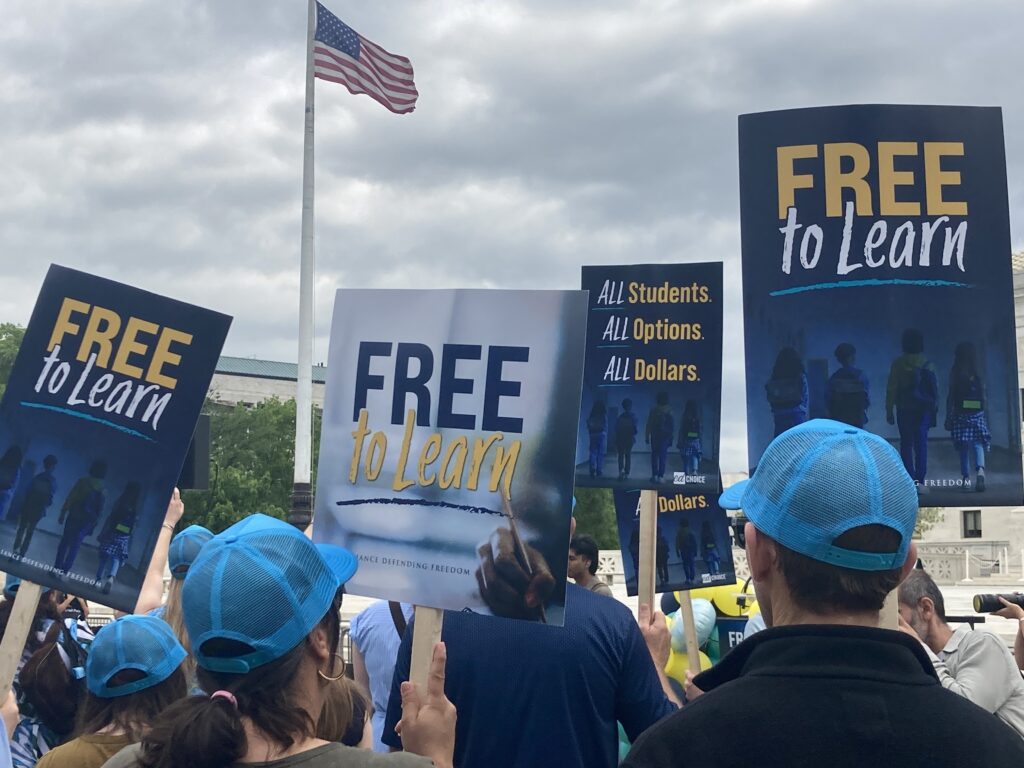The high court’s 4-4 ruling means that a decision by the Oklahoma Supreme Court will stand for now

WASHINGTON (OSV News) — An evenly-divided Supreme Court on May 22 sidestepped a major ruling in a case over what would have been the nation’s first Catholic charter school, effectively blocking the effort.
The high court’s 4-4 ruling means that a decision by the Oklahoma Supreme Court, which found the establishment of the St. Isidore of Seville Catholic Virtual School as a publicly-funded religious school was unconstitutional, will stand for now.
Justice Amy Coney Barrett, who may have otherwise been a decisive vote, recused herself from any involvement in the case. No official reason was given by the court for her decision, but Barrett was previously a professor at Notre Dame Law School, which worked on behalf of the proposed Catholic charter school.
OSV News reached out to the Archdiocese of Oklahoma City about the decision and is awaiting comment.
The effort by the Archdiocese of Oklahoma City and the Diocese of Tulsa, Oklahoma, to establish St. Isidore was approved by a state school board in 2023 but was challenged in court by the state’s attorney general. He argued a religious charter school with public funds would be a violation of both the constitutional separation of church and state and Oklahoma’s state law.
Proponents of the school argued its application met all criteria for approval as a charter school and should not be discriminated against for its religious identity. The Oklahoma Supreme Court later sided with the attorney general.
“The judgment is affirmed by an equally divided Court,” the Supreme Court wrote in an one-page, unsigned ruling about the lower court’s decision. The ruling did not specify how each justice voted on the issue, which is typical in cases where there is no majority.
In court filings, Oklahoma Attorney General Gentner Drummond argued that permitting the school to move forward could pave the way for Oklahoma taxpayers to subsidize schools that hold religious beliefs contrary to their own. In a statement on X about the court’s ruling, he said, “The Supreme Court has ruled in favor of my position that we should not allow taxpayer funding of radical Islamic schools here in Oklahoma.”
“I am proud to have fought against this potential cancer in our state, and I will continue upholding the law, protecting our Christian values, and defending religious liberty,” Drummond said.
In prior statements, Drummond said that if Oklahomans are “being compelled to fund Catholicism … tomorrow we may be forced to fund radical Muslim teachings like Sharia law.” He then mentioned the governor’s openness to welcome a “Muslim charter school funded by our tax dollars” as evidence for his argument.
Both Catholics and Muslims, which Drummond singled out repeatedly, are also tiny minorities in Oklahoma, representing 8% and less than 1%, respectively, of the state’s population.
Drummond’s strident comments drew the attention of Justice Samuel Alito, who questioned during oral argument April 30 if the state’s argument against the proposed Catholic charter school was in fact “motivated by hostility toward particular religions.”
Alliance Defending Freedom, a public interest firm involved in the case, argued the early U.S. government had examples of direct support for religious schools, shortly after the Constitution was enacted, including an 1803 treaty with Native Americans providing financial support for a Catholic priest involved in education. ADF argued the rise of public schools, with Scripture reading and prayer, in the 1800s served as a government-backed “form of ‘least-common-denominator Protestantism.'”
As the Catholic Church established its own schools in response, ADF noted lawmakers began enacting legislation in the 1870s, often known as Blaine Amendments, that prevented Catholic schools from receiving funds on the basis that they were “sectarian” schools.
The Catholic charter school case placed Drummond and the state’s Gov. Kevin Stitt — both Republicans — at odds with each other as the governor backed the effort.
Stitt wrote on X that “the Supreme Court’s non-decision” means the matter is “far from a settled issue.” He noted another case will be coming where Barrett would not have to recuse herself and therefore would break the tie.
“This fight isn’t over,” he said.
– – –
Kate Scanlon is a national reporter for OSV News covering Washington. Follow her on X.


